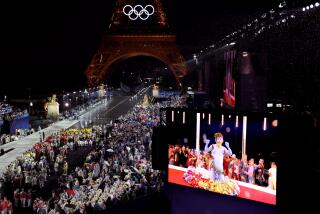The Economic Summit : Thatcher Steals Paris Scenes, Denies Suffering ‘Diplomatic Slight of Any Kind’
- Share via
PARIS — British Prime Minister Margaret Thatcher insisted Sunday that she had “not suffered any diplomatic slight of any kind whatsoever” during her four days here for the celebration of the French bicentennial and the annual summit meeting of the seven leading industrial democracies.
Pausing for dramatic effect during a press conference that followed the close of the summit, the outspoken British leader glared at the Australian reporter who asked about her alleged maltreatment at the hands of French protocol officials.
“You look very disappointed,” she said triumphantly.
It was a perfect conclusion to a bravura performance for Thatcher in her visit to France. Not since the late Charles de Gaulle graced the world stage had a leader had so much fun stealing scenes from her fellow actors. And on De Gaulle’s home turf, no less.
“As usual,” wrote the London Sunday Observer, “Mrs. Thatcher had cast herself as the wicked fairy at the feast.”
Thatcher, determined not to let the French dominate their own party, began her performance before she set foot on French soil. In interviews with a French television network and the newspaper Le Monde, she questioned the originality of the Declaration of the Rights of Man, the French revolutionary document chosen by the Socialist government as the centerpiece of its bicentennial fete.
The ideas expressed in the French declaration, Thatcher said, dated to the ancient Greeks and were even contained in the English Magna Charta, which preceded the Rights of Man by more than 550 years. Without saying so, she suggested that the French celebration was excessive, perhaps even in poor taste.
As a result, Thatcher was booed by crowds at two of her appearances in Paris. Unperturbed, she also remained coldly silent when she was placed in the back rows of world leaders at the gala opening of the Bastille Opera and at a ceremony at the Trocadero.
Some of Thatcher’s aides, however, were not so tight-lipped. When credentials for their delegation were lost, they suggested an intentional slap by the French. Likewise, they contended that their segment of the big Bastille Day parade Friday night, consisting mainly of a bagpipe band and a pair of double-decked London buses, was not sufficiently appreciated by the French, who seemed to prefer the Florida A&M; marching band from the United States.
“It was a tough week for les rosbifs, “ wrote London Sunday Times columnist Christine Toomey, using French slang for the British. “Not content with booing and snubbing Mrs. Thatcher, the Parisians yawned through Britain’s contribution to the Bastille Day parade.”
French Premier Michel Rocard jumped awkwardly into the fray by announcing in the middle of events that British domestic policy under Thatcher amounted to “social cruelty.”
By this time, the Thatcher episode had developed into a kind of press frenzy. Some newspapers speculated that a gala dinner scheduled for Sunday night had been canceled in the face of a threatened boycott by Thatcher. French television reported that she was in a bad mood, particularly after she was required to wait 35 minutes to leave the Bastille Opera as an assortment of Third World leaders, including military dictators, preceded her.
One television commentator got so carried away that he suggested: “The French-British war had started again.”
Through it all, Thatcher remained silent, neither confirming the snubs nor doing anything to diminish the rumors about them. This allowed her to be gracious and magnanimous when she appeared at the concluding press conference Sunday.
French President Francois Mitterrand, she said, had behaved like a perfect gentleman. “We have had a very good, excellent relationship,” she said.
Some of the bad seating arrangements given her by the French, she said, could be explained because as prime minister she is only the leader of her government, while the other leaders here are chiefs of state.
At dinners attended by the leaders of the seven industrial democracies, she added, she was always seated to the right of Mitterrand, with President Bush on Mitterrand’s left.
She said she had a wonderful time at the big French party and praised its organization.
If Mitterrand had decided to go ahead with his gala dinner Sunday, she said, she would have gladly attended.
Still, she could not resist one last, genteel parry.
Asked if she had changed her views about the contributions of the French Revolution, she said: “They would hardly change because they are based on historical fact. The Magna Charta is a historical fact.
“I can’t change history,” she said, looking every bit like someone who was certain she could, “and neither can you.”
More to Read
Sign up for Essential California
The most important California stories and recommendations in your inbox every morning.
You may occasionally receive promotional content from the Los Angeles Times.













